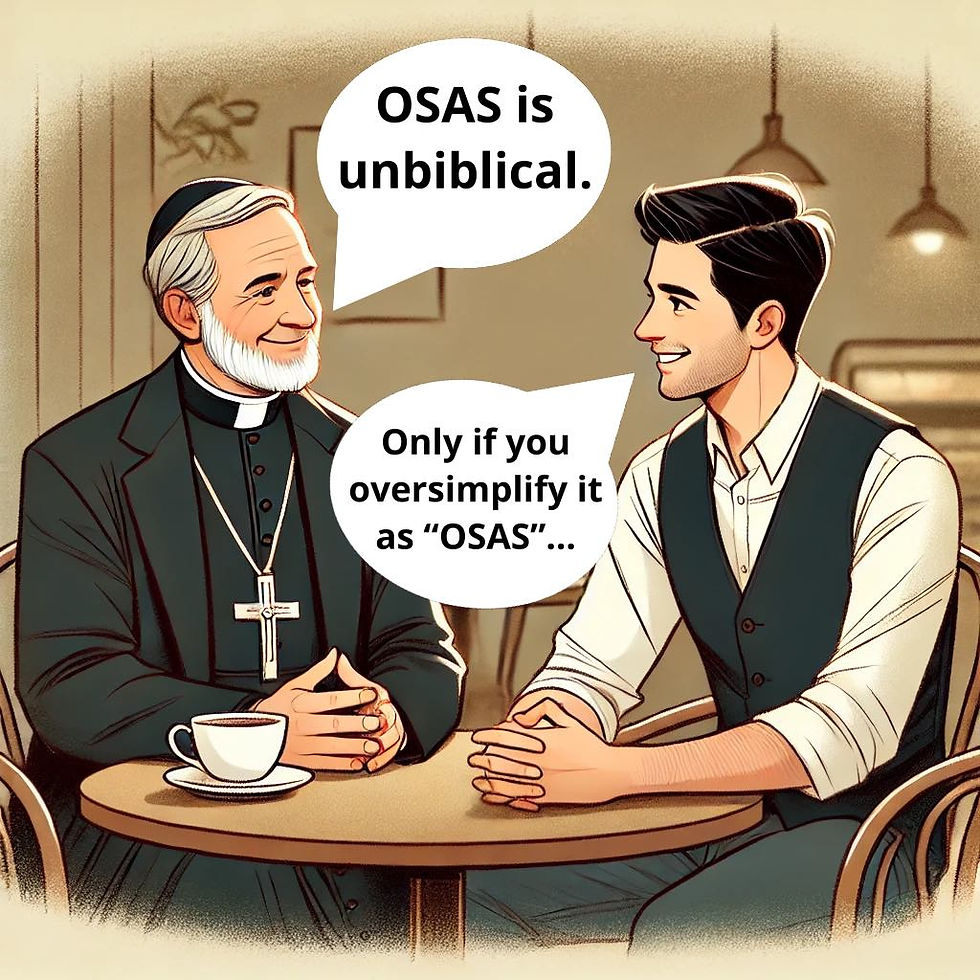How many is all? How all is many?
- Bible Brian

- Oct 17, 2022
- 4 min read
Updated: Aug 1, 2023

Limited Atonement is, without doubt, the least supported of all Calvinist doctrines, to the point where if you meet a 4 point Calvinist, this is more than likely the point they reject. Scripture is clear, "For there is one God and one Mediator between God and men, the Man Christ Jesus, who gave Himself a ransom for all..." (1 Timothy 2:5-6a). This immediately follows an exhortation "...that supplications, prayers, intercessions, and giving of thanks be made for all men, for kings and all who are in authority..." (v1b-2a), because God "...desires all men to be saved and to come to the knowledge of the truth." (v4).
"Not so!", say the 5 point Calvinists. These suggest we should interpret Paul's words in 1 Timothy 2:1-6 in light of Christ's words in Matthew 20:28 and Mark 10:45. In both instances, Christ says He came to give His life as a ransom for many, not for all. Therefore, Calvinists suggest, when Paul says God wants all men to be saved, and therefore Christ gave His life as a ransom for all, He can only mean all the elect.
This is a particularly strange tendency for Calvinists. Every time scripture suggests Christ made propitiation not only for our sins, but for the sins of the whole world (e.g. 1 John 2:2), whatever all-encompassing word happens to be used to show this, be it "whole world", or "all men", or whatever happens to be there, that word is substituted for "the elect". I say this is strange because Calvinists are typically very good theologians, being quite willing to let the Bible say what it says in most other cases, yet though the omniscient God is quite capable of using the term "the elect" elsewhere (e.g. Matthew 24:24; Romans 11:7), He apparently needs their help adding it back into other scriptures.
But going by standard exegetical principles, rather than that designed specifically to insert Limited Atonement into passages that utterly refute it, we see that Limited Atonement simply has no Biblical leg to stand on. See, a standard method of Biblical interpretation is that the clear interprets the unclear. The opposite is never the case.
So, with that in mind, consider first that when Jesus said He came to give His life as a ransom "for many", He actually hadn't ascended yet, nor had He even died. In other words, the Apostles were still debating what it meant that Jesus was going to rise from the dead (Mark 9:9-10), Peter was still going to rebuke Jesus for even suggesting He was literally going to die (Matthew 16:21-23), and the Holy Spirit, who was going to guide the Apostles into all truth (John 16:13), had not yet come with the teachings Jesus had for them that they "couldn't bear" at the time (John 16:12).
All that to say, at the time Christ said He came to give His life as a ransom for "many", He wasn't giving them a full sermon on the doctrines of grace, and doesn't seem to have intended to comment on the extent of the atonement at all.
This is seen in the fact that "many" isn't even a clear word. It gives neither precise value, nor percentage. Therefore, when we hear the word "many", we are left with the question "how many?" And "all" is a valid answer. "I've had so many biscuits today". "How many?" "All of them".
And so, when Paul says Christ gave His life as a ransom for all, Paul, being guided by the Holy Spirit during the time He was guiding Christ's Apostles into all truth, was answering the question Jesus left us with when He said He came to give His life as a ransom for many. How many? For all. "...for all men, for kings and all who are in authority...", because God "...desires all men to be saved and to come to the knowledge of the truth."
I couldn't make it any clearer. It's so clear, in fact, that I didn't need to edit the verses. I don't need to turn "all men" into "all the elect", I don't need to insert the words "kinds" or "categories", and I don't need to reduce "all" into "many". With neither the desire, nor the intention, to force Limited Atonement into scriptures it cannot otherwise be found in, I can afford to just let Paul say what he, by the guidance of the Holy Spirit, was lead to say.
Now, if the clear interprets the unclear, then clearly Christ gave His life as a ransom for all. That means the atonement must be unlimited in its scope. Every single human being who has ever lived, if they had come to faith, would have been saved, and every human being who still lives, if they repent, will likewise be saved. Christopher Hitchens, though he died in unbelief, and his sins are retained, would have been saved if he had confessed the Lord Jesus, and believed in his heart God raised Him from the dead, and this would not have required a single difference to the crucifixion, nor would another Christian have had to be condemned. Limited Atonement simply cannot hold water, and I submit that puts Calvinism, in its purest form, into a watery grave.






Comments